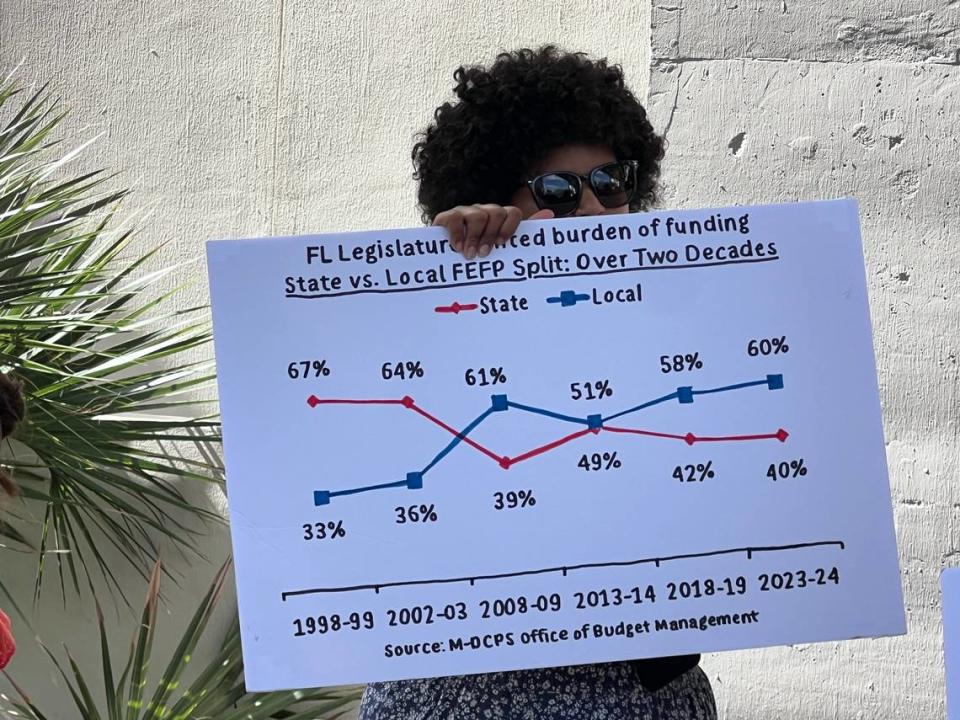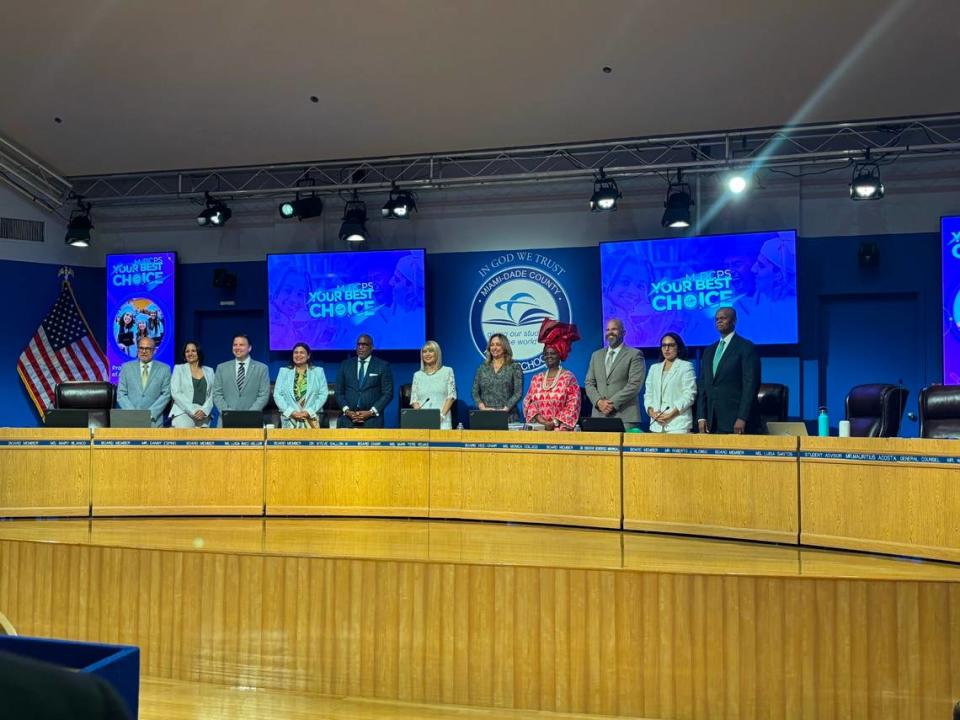School choice is diverting funds from traditional Miami-Dade public schools, say activists
Outside Tuesday’s Miami-Dade County School Board meeting, parents, advocates, policy leaders, and students gathered to protest what they say is the defunding of traditional public schools.
Some came with signs reading, “We chose public schools, fully fund our choice.” Another sign showed a graph illustrating the amount of state and local funding for public schools over the past two decades.

At the meeting, the school board voted to approve new boundary changes that include the repurposing of Shadowlawn Elementary in Miami and Parkview Elementary in Miami Gardens, schools serving historically Black and immigrant communities.
Parkview Elementary will be re-envisioned as a Specialized Exceptional Student Education and Full-Service Resource Center, displacing approximately 105 students. Parkview Elementary has a majority Black student body.
Around 74 students from Shadowlawn Elementary will be assigned to a new school under the new boundaries.
The item also would establish new boundaries for Calusa Elementary, Claude Pepper Elementary, Crestview Elementary, Eneida M. Hartner Elementary, North Twin Lakes Elementary, Scott Lake Elementary, Toussaint L’Ouverture Elementary, and Twin Lakes Elementary for the 2024-2025 school year.
Outside the meeting, the activists argued that these school boundary changes and repurposings are the result of efforts to fund voucher programs and charter schools to the detriment of traditional public schools.
“This is a systematic diverting of dollars from public education to private schools,” said Mina Hosseini, executive director of P.S. 305, an education advocacy group in Miami-Dade County.
“This is a small example of something the board is forced to do based on state funding,” said Hosseini.
Ziko Fremont, a father and local business owner whose daughter just finished fifth grade at Shadowlawn Elementary, said he is disappointed his other children can’t continue at the school. Fremont also has two children he adopted from Haiti, ages 11 and 7. The 11-year-old had just adjusted to attending school in the United States and thrived at Shadowland. But next year, she will need to find a new school.
One of the reasons Shadowland is closing is the physical condition of the school, says Fremont.
“The Miami-Dade Public Schools knew that each school was on the verge of deteriorating. Why aren’t our school system and lawmakers finding ways to change that?” asked Fremont, who lives across the street from Shadowlawn, located near Little Haiti.
Another Shadowlawn parent, Moses Dany said that because of the repurposing, he does not know where he will send his son next school year.
“I don’t think closing schools should be a natural process,” said Dany, who attended public schools himself and is now a firefighter and paramedic for the City of Miramar. He said he believes public schools should be given more resources because “every child deserves a nice education.”
Dr. Steve Gallon III, the school board member for District 1, said before the meeting that many factors are taken into consideration when deciding whether to create new boundaries for schools – including enrollment, curriculum choices, and demographics of a neighborhood.
“I understand that our public school system is now broadly defined,” said Gallon of the changes.
During the meeting, board members Roberto J. Alonso, Dr. Dorothy Bendross-Mindingall, Gallon, Mari Tere Rojas and Monica Colucci all responded to speakers during the public comment who were opposed to the boundary changes. The board members were in agreement that the boundary changes happened in a transparent manner with sufficient public input.

Bendross-Mindingall, who represents District 2 where Shadowlawn Elementary school is located, said at the meeting that the boundary change is a result of changing demographics of neighborhoods. She supported the boundary changes.
Parents and activists fear that the conversation in Miami-Dade will eventually shift to school closures, which has dominated discussions at the school board in Broward County. Former superintendent Peter Licata was tasked with coming up with a plan to close, repurpose or combine several of the county’s underenrolled and dilapidated schools. After Licata retired due to health concerns, his replacement, Howard Hepburn pushed pause on the idea of closing schools for the moment. The latest plan in Broward involved boundary changes and combining schools. But school closures are not off the table.
In Florida, legislation facilitating school choice has dominated the agenda for the past several years.
During a recent Florida Board of Education meeting in Miami, the commissioner of education Manny Diaz, Jr. pointed out that parents in the state now have increased opportunity to choose whether they want to send their children to a public, private, or charter schools.
In March 2023, Governor Ron DeSantis passed legislation that made it possible for every school-aged child in Florida to get a taxpayer-funded education voucher of up to $8,000 a child. Previously, the program was limited to families with certain incomes. In the first year of the newly expanded voucher program, most of the funds went to students who were already enrolled in private schools.
In the upcoming fiscal year, $3.9 billion will be allocated to vouchers in Florida, according to to the Florida Policy Institute.
But opponents of vouchers say that the increased appropriations for vouchers is just another thing that weakens our public school system.
“If you want your kids to go to a private school, then you should pay for it,” said Norin Dollard, senior policy analyst at the Florida Policy Institute who was at the rally outside the school board meeting.
“Public schools are a public good,” said Dollard.


